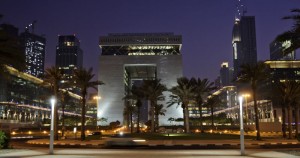Recovering Dubai faces billions of maturing debt

A night view of the Gate building is seen at the Dubai International Financial Center, DIFC, in Dubai, United Arab Emirates, Sunday Aug. 7, 2011. Stocks tumbled across the Middle East on Sunday as most regional markets reopened following the historic downgrade of the United States’ credit rating. The region’s markets mostly operate Sunday to Thursday. That meant they were the first to react to credit rating agency Standard & Poor’s decision late Friday to cut the U.S. level one notch to AA+ from its top AAA rating. AP FILE Photo
DUBAI — As debt-laden Dubai’s economic recovery continues, with grandiose projects making a comeback, the emirate faces some near-term maturity of debt racked up during pre-crisis years but the prospects are not gloomy, analysts say.
Dubai is likely to manage the forthcoming obligations, part of total debt amounting to 100 percent of its gross domestic product, according to Masood Ahmed, the Middle East director at the International Monetary Fund.
“Yes, it can manage,” he told AFP, highlighting the need to be open about the process.
“There is a substantial amount of debt that is coming due in the next few years, and it will be important to manage proactively that process. Information and communication with potential market participants will be a key part of this,” he said.
In recent years, Dubai has restructured billions of dollars of debt, mainly that of its Dubai World group, which rocked global markets in 2009 when it signalled that it could not repay some $26 billion of debt.
“There is likely to be another round of restructuring from 2014 to 2016, when much of Dubai’s borrowing to restructure the first round of debt from 2009 will mature,” said Monica Malik, chief economist at EFG-Hermes Emirates investment bank.
That “includes loans from Abu Dhabi and the UAE central bank, which should be rolled over easily,” she said.
Deep-pocketed Abu Dhabi is a fellow member of the seven-state United Arab Emirates and stepped in when Dubai was battling to solve Dubai World’s debt problems.
But Dubai World later proved to be only the tip of the iceberg.
Dubai and its government-related entities (GREs) had accumulated some $113 billion of debt, with $36.5 billion coming due next year only, according to EFG-Hermes.
But $20 billion of that is owed to the UAE central bank and the government of Abu Dhabi.
“We expect this to be rolled over, making overall 2014 repayments manageable,” said Malik.
Dubai has $9.4 billion of debt maturing in 2013, compared with $14.6 billion in 2012.
Among the positive signs have been announcements by the government and GREs of deals to restructure some due debt, or repayment of maturing bonds.
Earlier this month, Dubai’s government said it repaid 3.34 billion dirhams ($910 million) of bonds that came due in April. The redeemed bonds were part of a 15-billion-dirham bonds programme issued in 2008.
“This repayment reaffirms Dubai government’s commitment to deal with its repayment obligations in a proactive manner,” said Abdulrahman al-Saleh, director general of Dubai’s department of finance.
“It also strengthens the government’s resolve to honour all its financial obligations on time,” he said.
Dubai Group, a unit of ruler Sheikh Mohammed bin Rashid al-Maktoum’s Dubai Holding investment arm, also said this month it was nearing a deal with its creditors to restructure $10 billion of debt after three years of talks.
“For instance, where a full repayment cannot be made, we expect a continuation of the trend established over the past one-two years of a partial capital repayment coupled with a rollover of the remaining debt,” Malik said.
She said the fixed-income market is expected to be the main source of financing, because local banks are constrained by central bank-imposed exposure limits and many European banks continue a “retrenchment” from the Middle East.
Dubai’s economy grew by just under four percent in 2012, and is expected to grow by little over four percent this year, Ahmed said.
“We see a process of recovery that is quite broad based,” he said, citing growth from “logistics, trade, and also from real estate.”
“In that sense, the Dubai economy is doing better,” he added.
Dubai’s non-oil trade surged by 13 percent in 2012 to $336 billion. Its airport is now the world’s second busiest for international travel, handling 57.68 million passengers in 2012.
A number of grandiose property and theme parks projects have been announced recently, reminiscent of the five-year heyday of rapid real estate growth in the glitzy emirate that preceded the 2009 crash.
Real estate and rental prices have also been surging after being chopped by a half during the crisis. Real estate agents are back on their phones calling owners and promising wealthy cash buyers.
But such euphoria triggers warnings of being carried away.
“As we embark now on these mega projects, this ambitious expansion plan needs to be executed in a measured way that is gradual and limits additional risk taking for the still highly-indebted GREs sector,” Ahmed said.
George Abed, director of the Institute of International Finance, warned of repeating the mistakes of the past.
“We think the lessons of the debt crisis have been largely absorbed but in some quarters we hear sometimes a note of euphoria, perhaps, and excitement, exuberance that should be cautioned against,” he was quoted by The National daily as saying.














